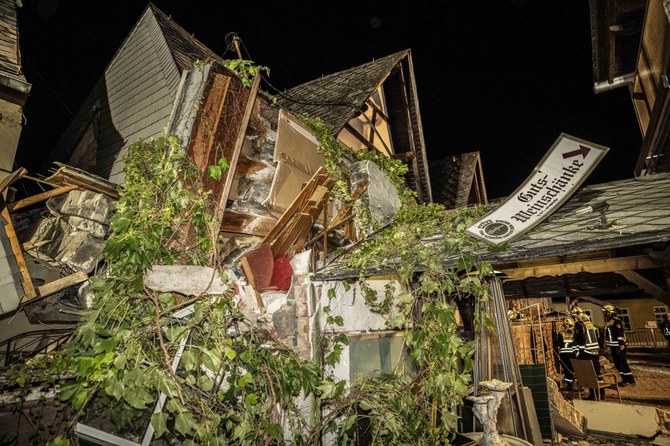KROEV, Germany: A hotel in Germany’s picturesque Moselle wine valley collapsed overnight, killing two people, local police said on Wednesday, as rescuers worked urgently to pluck the three remaining trapped guests from the rubble.
One woman’s body was recovered but emergency responders have not yet been able to reach the body of the second victim, a male, rescue operation chief Joerg Teusch said.
Four people have been rescued, none of them with serious injuries, Teusch said, in a complex operation as the two-story building was unstable after its upper floor caved in late on Tuesday.
Among those rescued was a two-year-old child, who was not injured, and the child’s parents, with whom rescuers were able to establish contact overnight.
Michael Ebling, interior minister in the state of Rhineland-Palatinate, said he was hopeful that the remaining three people would be saved as rescuers worked with extreme caution due to the risk of further collapse.
The cause of the accident was not yet clear. Investigations would begin once the rescue operation was complete, state prosecutor Peter Fritzen said.
SUMMER SEASON
Some 250 police officers, firefighters and paramedics were deployed to the site in the town of Kroev, a popular holiday town surrounded by the steep, vineyard-covered banks of the river Moselle.
Emergency services used a crane and sniffer dogs to assist the operation.
The incident comes during the busy summer season, when the region’s historic wine taverns are often full of tourists.
The hotel that partially collapsed — identified by a Reuters witness as the Reichsschenke “Zum Ritter Goetz” — is named after a medieval knight who is said to have once drunk at its wood-paneled tavern and has been immortalized in a play by Wolfgang von Goethe.
Investigators believe 14 people were in the hotel when the upper floor caved in, five of whom escaped without injury.
Police said 31 people were evacuated from their nearby homes for their own safety.



























